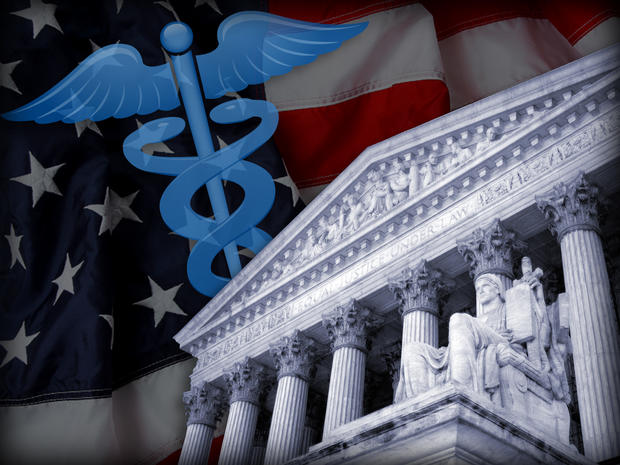A post-Supreme Court guide to the health care law
(CBS News) Now that the Supreme Court has upheld the Affordable Care Act, it's moving forward, barring a successful Republican effort to repeal the law.
Many parts of it have already been implemented, including allowing children to stay on their parents' insurance until the age of 26, free preventative care such as child immunizations, birth control and mammograms. Other already-implemented components include coverage previously excluded from health insurance because of pre-existing conditions. Lifetime caps on health coverage have also been eliminated.
But major parts have yet to implemented; this is what it could mean for you:
What if I am an individual that currently doesn't have health insurance?
There are more than 30 million of you. You don't have health insurance perhaps because you don't qualify for government programs Medicaid for the poor or Medicare for the elderly or disabled. Or you lack health insurance because your employer doesn't offer it or you choose to go without.
Starting in 2014, the individual mandate, which requires the purchase of health insurance, applies to you.
Where would I get health insurance?
There are two ways to purchase health insurance, either directly from a private health insurance plan, just as you would now, or through a marketplace, or exchange, run by the states. If you live in a state that chooses not to participate, the federal government will run the exchange.
What is an exchange?
The health insurance exchange is expected to offer multiple health insurance plans to choose from, including a multi-state option that is run by the same federal government agency that runs federal employees' health insurance plans. The incentive for health insurance companies to participate in the exchanges is the new, untapped market - potentially millions of new customers.
Each exchange is required to offer four tiers of plans. The lowest plan, called the bronze tier, will be the cheapest to purchase but have the least amount of coverage - similar to a catastrophic plan. The highest plan, platinum, would be the most expensive with the most options and lowest deductibles and co-pays. It is up to each consumer to choose the appropriate plan.
What if I can't afford health insurance?
If you participate in the exchanges, you are eligible for subsidies. A sliding scale of subsides calculated by age and income are available for those making between 133 to 400 percent of poverty level - an income of $92,000 for a family of four. The older and poorer a person is, the greater the subsidy. People with income below 133 percent poverty level are eligible for Medicaid.
If an uninsured person chooses to avoid the exchanges and purchase health insurance directly through the insurance company, subsidies are not available.
What happens if I don't want to purchase health insurance?
You will have to pay a penalty, or a tax. The first year of implementation - 2014 - the fee is either $95 or 1 percent of your income, whichever is greater. If in 2016 you still don't have health insurance, the fine increases to $695 per adult and $347.50 per child, up to $2,085 per family or 2.5 percent of your income, whichever is greater.
I have health insurance. Will I be able to keep my current health insurance plan?
If you receive health insurance through your employer and you work for a company with fewer than 50 employees, it is possible that your employer might switch health insurance plans, which is currently an option for any employer. Another option for your small business employer is to join an exchange for small businesses to pool their health coverage, called the Small Business Health Option Program, which, in that case, your health insurance provider could very well change.
Another possibility is that a small business with fewer than 50 employees could drop your health insurance because it isn't required to provide it. If that happens, you will have the options mentioned above through the individual market.
What incentive does my employer have to keep providing health insurance?
Your employer faces a $2,000 fine per employee after the first 30 employees if health insurance is not provided to employees.
If you're employer employs less than 25 employees and the average wage of employees is less than $50,000, tax credits are available for your employer, which might be an incentive to provide health coverage.
Will the cost of health care go up?
Possibly. The cost of health care is rising for a variety of reasons; however, the Affordable Care Act has several measures to attempt to control the rising cost of health care.
A board decides if health plan rate increases above 10 percent are justified, allowing the board to reject rate increases. In addition, a new rule says health insurance companies must spend 80 - 85 percent of its expenditure on health care costs. It restricts the amount they can use on overhead of profits.
According to Larry Levitt, senior vice president of Kaiser Family Foundation, the health care law created "a whole host of pilot projects to shift the way we pay for health care" in the Medicaid program. For instance, moving away from a fee-for-service system, where payment is determined based on services and tests, to a system that is focused on health care results.
How is this going to be paid for?
- A ten percent tax on tanning salon customers, which has already gone into effect.
- In 2018, high cost insurance plans, worth over $27,500 will receive a 40 percent tax. Union households are likely to be major recipients of the tax.
- The Medicare payroll tax will be extended to include a 3.8 percent tax non-payroll income such as capital gains earnings on couples making more than $250,000 per year.
- Fees are placed on insurance companies, medical device manufacturers and pharmaceutical companies.
